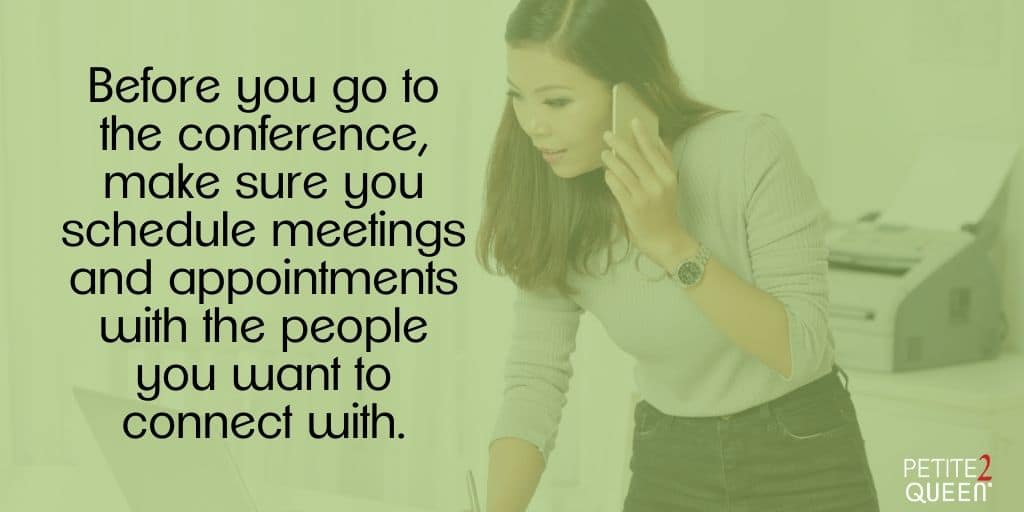How do you get the most out of conference attendance? Along with making genuine connections, what actionable commitments will build momentum? What are the key takeaways to gain traction and move the sales process forward? To accomplish all of these things, you need a strategy and planned tactics before you attend the conference. The following tips will lay the foundation for achieving your goals.
1. Identify Your Goals and Objectives
Every success starts with a purpose and fierce determination. So what is your purpose for attending the conference? Are you there for education, networking, sales, opportunities, or competitor espionage? Usually you will have multiple objectives, so prioritize them, and identify the methods to achieve each.
2. Do Your Research
You need a plan to achieve your goals and objectives, and every good plan starts with knowledge and understanding. Research the conference, sessions, attendees, exhibitors, venue, and location. Who do you want to meet – specific speakers, attendees, or exhibitors? Where can you schedule meetings onsite and off? How long will it take to arrive at the venue and navigate between activities? Never underestimate how long it could take you to get from a session to a coffee meeting. Some venues are vast or have multiple coffee shops onsite. Knowing your logistics will keep you on track for your meetings and sessions.
3. Schedule Meetings, Appointments, and Sessions
Before you go, make sure you schedule meetings and appointments with the people you want to connect with. Plan your days, from breakfast to dinner, and include key sessions you want to attend. Once you arrive at the conference, people will be busy, and many will not have time for you in their schedule. Nonetheless, remember to leave some open time in your schedule. This enables you to make schedule changes, add a meeting, or take a much-deserved break.
4. Evaluate Sessions and Certification Opportunities
Many conferences offer continuing education credits or courses for certifications. Review the opportunities early and register for the sessions and courses that will further your career and knowledge. Many fill up fast, so stay ahead of the curve and schedule these in advance.
5. Elevator Pitch
Who is your audience at the conference? What are their motivations and emotional triggers? Pivot your elevator pitch to match the conference attendees. You will need several variations based on the role and position of the person you are speaking to. Prepare questions that will drive conversation and establish an authentic connection.

6. Lead Management
While you may already have a robust lead management system, you need to execute on your lead plan before, during, and after the conference. Have a plan to ensure that do what you say you will do with every person you meet. Additionally, always have a secure and consistent location to store the business cards you gather at the conference.
7. Arrive Early
Set your pace from the start. Arrive early to gather your conference badge and materials. Walk the venue. Identify where the restrooms, coffee shops, session rooms, keynote location, and exhibit hall are located. Where are the power outlets and quiet corners to have a conversation? How long does it take for you to arrive from your hotel or local restaurants? Be prepared, and you will set yourself up for a successful conference.
8. Networking
Smile, make eye contact, and be approachable. Contribute to the conversations in the session and at your table. Demonstrate your interest, enthusiasm, and energy. Introduce yourself to the speakers after their sessions and share one thing from their session that was transformative. Take advantage of all of the hospitality and networking events. Join other individuals or groups at each to meet and make new connections.
9. Dress for Success
Dressing for success really matters. How do you want to be perceived? If you want to be taken seriously, then dress appropriately. Dress in layers so you can easily remove or add a jacket or sweater. Take advantage of coat checks at venues with inclement weather. Don’t haul it around with you all day! Wear comfortable shoes, as you’ll be on your feet a great deal. Consider wearing a statement piece, earrings, necklace, or pin. It can be a conversation starter!
10. Follow-Up Strategy
This is so basic and crucial, yet, surprisingly, many people fail to follow up. Stand out – follow up, follow up, and follow up again! In sales, this is vital to establishing your credibility. Do what you say you will do. Follow up with everyone you meet, whether through an email, LinkedIn connection, note, phone call, or in-person visit. Fulfill the commitment you made. Leverage your lead management strategy to further the relationship you established or built upon at the conference.
Conferences are a great opportunity for learning and connecting. Assess the information you collected during the conference, and organize, prioritize and share the information with your colleagues. What did you see that was new? What intel did you gather that would help your company? Think about what you learned. What new ideas can help you move forward? How can you get new business? Utilize all of this in your follow-up discussions and talking points to keep the momentum going long after the conference.
Want s deeper dive? Check out our recent webinar on Conference Attendance.
Petite2Queen provides virtual mentoring to young women in life, at work, and in sales. Follow us for more practical advice you can put to use to improve your life and career.

Lynn Whitbeck is the co-founder and President of Petite2Queen. She is focused on identifying and evaluating opportunities for women at work, helping them define their personal roadmap. She dedicates herself to delivering tools and insights, embracing visualization of the big picture, and identifying and implementing the minutiae of detail. Lynn aims to share lessons learned along her journey and enable positive uplift for women.


Comments 1
You are so right on about arriving early, presenting yourself properly and dressing the part. Folks may not realize this but when you are out in Public, people observe how you dress. I remember telling My Cousin on how important it is to dress for an Interview no matter what job it is. Show that you are interested and committed. Even now we live in a Business Casual Environment but still look professional and dress well.